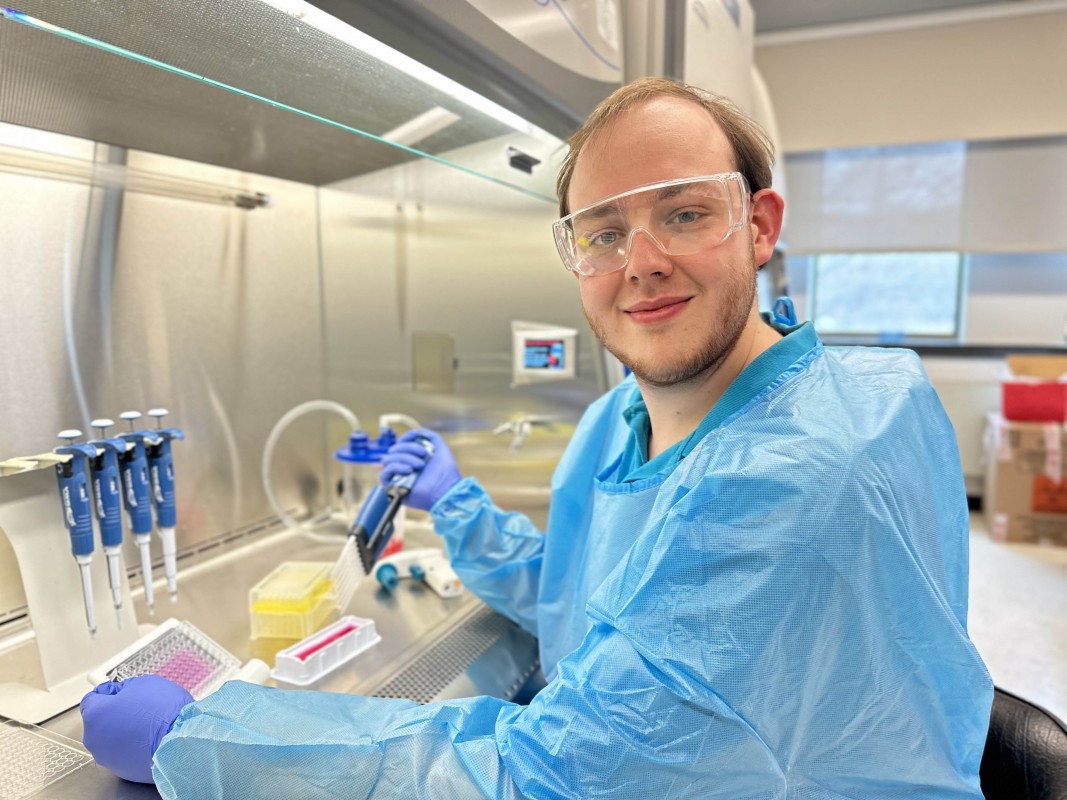Lab notes: Chemistry major receives the Goldwater Scholarship
Eric Talbott explores Binghamton’s research opportunities starting in his very first semester

Eric Talbott’s interest in research came by way of a scalpel, dissecting a pig’s heart in his sixth grade science class. Laid open, he saw how that heart had functioned, the role each part had played.
“I am a naturally inquisitive person and I find myself wondering how something works and operates,” said the Binghamton University Scholar, a native of White Hall, Maryland.
Now a sophomore chemistry major at Binghamton, he has already made strides toward his goal: to someday become a professor and researcher, like those who have mentored him. He was recently selected by the Barry Goldwater Scholarship and Excellence in Education Foundation and the Department of Defense National Defense Education Programs as a 2023 Barry Goldwater Scholar. It’s the second consecutive year that a Binghamton University student has won the highly competitive award.
“Being a Goldwater Scholarship recipient is extremely impactful in the science community, as it is highly recognized in graduate programs,” Talbott said. “Having this scholarship awarded as a sophomore is overwhelmingly appreciated.”
He hadn’t originally intended to apply as a sophomore, but received encouragement from Research Assistant Professor Susan Flynn, his mentor in the First-year Research Immersion program (FRI) and the campus coordinator for the Goldwater scholarship. Some good-natured sibling rivalry helped, too.
He learned about Binghamton from his brother John, who conducted collaborative research with Binghamton Chemistry Professor Eriks Rozners as an undergraduate at Elizabethtown College. As it happens, John became a Goldwater Scholar in 2021 and the brothers had a bit of a contest going.
“While the contest was very lighthearted, I technically won the rivalry since my brother won as a junior and I won as a sophomore, meaning I receive two years of funding,” Talbott said. “I am very grateful for all the support that I have been provided by my professors, mentors, lab mates and, most importantly, my family.”
A lesson in perseverance
Research has been part of Talbott’s Binghamton experience from his very first semester. He started off in FRI’s biomedical chemistry stream, where he ended up investigating the effects of chemotherapy on breast cancer cells, seeing if a combination of two drugs would allow for a lower dosage while remaining effective.
“I chose this topic because I was fascinated by the ability to see the cells I was working with under a microscope and then be able to make them fluoresce, so I could see the effects of my work,” he said.
He plans to continue in FRI as a peer mentor for new students. During his second semester at Binghamton, he joined Assistant Professor of Chemistry John Swierk’s lab and began exploring the underlying mechanisms of photocatalytic reactions — chemical changes prompted by light. So far, he has worked on three different projects.
“Eric is a very talented and enthusiastic research student who has made pretty remarkable contributions to the group despite being in his second year of college,” Swierk said. “He is always willing to learn new things and to get involved with lots of different projects going on in the lab.”
He’s had other accomplishments, too; last spring, he received the 10th annual Mike Starzak Summer Research Grant from the Department of Chemistry.
“When I came to Binghamton in the fall of 2021, I would have never expected to have accomplished half of what I have achieved already. I had dreams of joining a research lab and hopefully being published at least once, but I would have never expected to have the potential of three publications and being named a Goldwater scholar,” he said.
Talbott encourages his Binghamton peers to join a research lab in their area of interest. Research teaches important life and career skills, and perhaps most importantly, perseverance: It takes time to find a lab that will accept you and, once there, not every project will be a success.
But that’s a necessary part of the journey, Talbott advised.
“This process teaches you about your strengths and weaknesses and how to improve them to become a great student,” he said.
